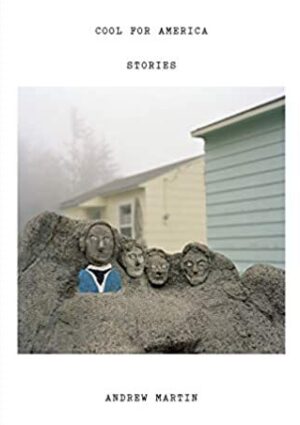Cool for America
by Andrew Martin
reviewed by Sebastian Sarti
At one point in Andrew Martin’s short-story collection, Cool for America, a college grad explains why he left Amherst for the University of Montana: he was unable to “deal with all the New England horseshit—the Barbour coats, the sports, the interest in the goddamned leaves.” These superficial reasons are followed by the only one that makes sense: “He was on the verge of failing out.” This tendency to cloak embarrassing truths in warped principles is one Martin extends to many of his characters in his occasionally incisive fiction.
As a follow-up to his debut novel, the cheekily entitled Early Work, Cool for America gives readers more of the same: overeducated, hyper-literary ne’er-do-wells viewing life with an irony-tinged skepticism. The characters live in New Jersey, Brooklyn, Virginia, and Montana, but the differences in locale vanish within the bookish pockets they inhabit. In these spaces they abet infidelity, drug addiction, and alcoholism while pining for cruel people and taking advantage of kind ones. None of them are really evil—just selfish and confused. A few probably think of themselves as “nice guys.”
One of those self-believing “nice guys” is Derek, an editorial assistant who becomes a committed book club attendee solely to spend time with his crush, Violet, in “Childhood, Boyhood, Youth.” Violet repays his attention by nominating him for “rookie of the year” and describing him as “just a boy … from some terrible state that starts with an I.” (He’s from New Jersey.) After a summer of trying and mostly pretending to read War and Peace—one of many instances where intentions don’t align with actions—the group has a debauched finale at a Russian supper club. At the meeting’s close, Derek takes a cab with Violet and her roommate to their apartment. Less drunk than the girls, he turns down Violet’s sly proposition but is caught thinking, “It was an investment, his decency. It would accrue interest.” In a gesture common to Martin’s stories, Derek’s self-awareness exposes his morality as a self-interested performance. The ironic self-awareness of Martin’s characters saves the collection from being the worst version of itself: just another book about writers and writer-adjacent people behaving badly.
Martin’s dexterity with sarcasm is worth appreciating. The book club in “Childhood, Boyhood, Youth” is discussing its “least valuable player,” and one person says, “Everyone was so valuable … You can’t attach value to people … Tolstoy? Gandhi? Hello?” Another girl suggests an absent member, then criticizes herself: “Maybe that’s ‘not nice’ and we should ‘respect all members of the group no matter how tertiary and useless.’” Still another nominates herself as least valuable but discovers that “only a man can be least valuable.” Built on irony and allusion, the discussion plays out like an elaborate joke. Martin delivers thoughtful sarcasm in place of glib sincerity to distance characters from themselves so that they share the same vantage point as the reader.
Martin’s greatest skill is writing without self-importance and creating characters who are hyper-analytical without being soapboxes for his thoughts on fiction or virtue. Unfortunately, his stories too often retread the same ground: intrigue in one story feels like convention, and then parody, as it repeats throughout the collection. Substance abuse, hyper-literary characters, misalignment of intentions to actions, and ironic detachment are only some of the repetitive tropes. Add to this list the whiteness of the characters, the flippant, left-leaning politics, economic and educational privilege, malaise, and arrested development, and you have a world rich in self-awareness but otherwise lacking.
It’d be one thing if these features were distinctive in contemporary literature, but the aggrieved writer and loathsome yuppie are so familiar as to undercut the originality and humor of Martin’s work. His one-liners, his appreciation of hypocrisy and detachment, the rhythmic feel of his sentences, and his eye for zingers all provide some fun. But one can’t help agreeing with one of his own characters’ assessment of a disappointing writer: “Leave it to somebody else to pierce the human heart with punctuation.”
Published on December 8, 2020

